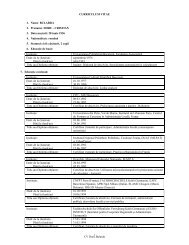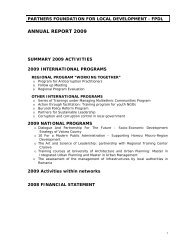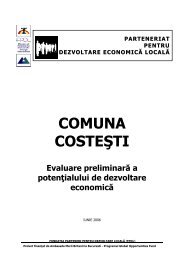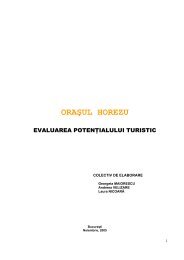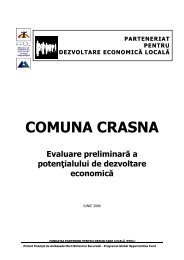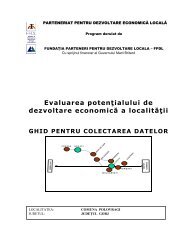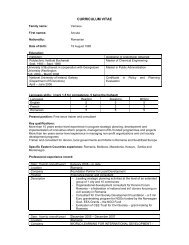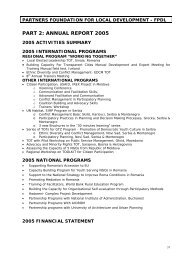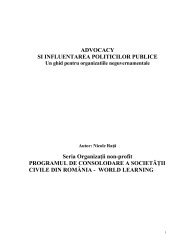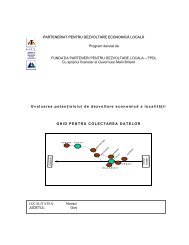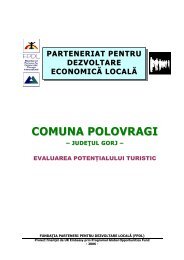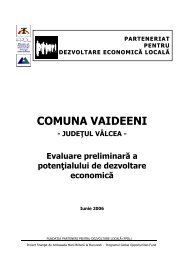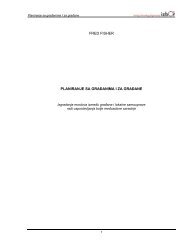Organizational Development: A Manual for Managers and ... - FPDL
Organizational Development: A Manual for Managers and ... - FPDL
Organizational Development: A Manual for Managers and ... - FPDL
Create successful ePaper yourself
Turn your PDF publications into a flip-book with our unique Google optimized e-Paper software.
Rational choice gives more chances to survive that r<strong>and</strong>om choice, providing that in<strong>for</strong>mation<br />
about the situation <strong>and</strong> the applicable set of the rules are good enough. Lack of or poor in<strong>for</strong>mation<br />
can be a weak point.<br />
An organism’s perception of where it is <strong>and</strong> how things are is not exactly the same as where it is<br />
<strong>and</strong> how things are in reality. An organism does not necessarily react to actual reality, but to its<br />
always limited <strong>and</strong> more or less compromised perception. Thus, what looks rational from one point<br />
of view, based on a certain picture of reality, may look irrational from a different point of view,<br />
based on different in<strong>for</strong>mation about the situation.<br />
On the other h<strong>and</strong>, the basic rules of life, drawn out on one’s own, or ‘borrowed’ through education<br />
or another’s experience, is never absolutely complete <strong>and</strong> correct. Some rules merely proved to be<br />
correct enough to give a sufficiently good prognosis in an older time; they may not be valid any<br />
longer. Other rules <strong>and</strong> regularities may remain unknown. In the worst case – some borrowed<br />
‘rules’ may not be rules at all. For example: ‘One can only rely on the members of his family.<br />
Strangers will never help.’ Thus, what looks rational when applying one set of rules, which are<br />
known to this organism, may look irrational when applying ‘wisdom’, based on different experience<br />
fixed in one’s ‘mental map’.<br />
The range of available options also depends on available resources of any type or nature. That<br />
may be time, money, space, or skills, whatever is considered to be usable <strong>and</strong> is limited. In fact,<br />
when resources are different, the situation is different. The greater resources in h<strong>and</strong> – the more<br />
paths of action available, creating a better possibility <strong>for</strong> rational choice <strong>and</strong> increased chances <strong>for</strong><br />
success. For example, with $1,000 in one’s pocket, a person may have more options <strong>for</strong> travelling<br />
to London than with $50.<br />
In human organizations, considered alternatives may also be bounded by certain constraints that<br />
might <strong>for</strong>bid or fix as highly objectionable certain potential goals or ways of action (these are<br />
marked in red on Picture 4). The opposite may also happen – some additional criteria, which has<br />
nothing in common with the parameters of rational choice at the given level, may promote some<br />
potential goals or trajectories as being more desirable. These additional limitations or priorities,<br />
which may distort the picture of rational behaviour <strong>and</strong>, in fact, always narrow the space of<br />
available actions - thus making behaviour more predictable - we call politics.<br />
In its common meaning, ‘politics’ is the process by which decisions are made within groups. A<br />
similar word, ‘policy’, means a plan of action to guide decisions <strong>and</strong> actions<br />
(http://en.wikipedia.org) Author is not in position to find better term in English <strong>for</strong> the abovedescribed<br />
notion. But in Lithuanian, Russian <strong>and</strong> some other languages it works well.<br />
30



